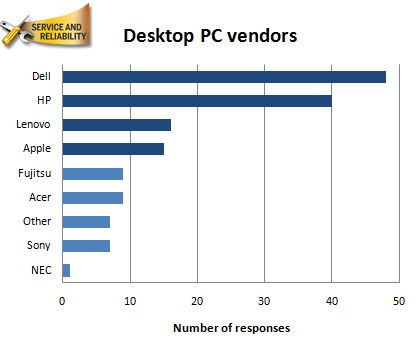Service & Reliability Survey 2010: Desktop PCs

DESKTOP PCs
Which vendors do you use for desktop PCs?
We received information on desktop PCs from 77 respondents. On average, respondents' organisations used just over two PC vendors each, giving a total of 155 responses. Dell and HP dominate the scene:

Other vendors cited: Viglen, Mesh, Stone, Asus, Shuttle, custom
Which operating systems are installed on your PCs?
Windows XP is the most widely used desktop operating system in our survey, with 22 respondents (32 percent) having it installed on 'all' their PCs and 32 (46 percent) running it on 'many'.
The Windows Vista chart is notable for its bias towards 'none' and 'few' installations, while Windows 7 — just a few months after its launch — is clearly beginning to make inroads into the desktop population.
Only five respondents reported Mac OS X on 'many' systems and two on 'all'. Linux was in even more of a minority on the desktop, with one 'many' and one 'all':
Other OSs cited: Windows 2000, Solaris
Which desktop PC form factors are deployed?
Traditional desktop form factors — tower, mini-tower and workstation — predominate in our survey sample. Smaller, lower-power, systems like all-in-ones, small-form-factor PCs and thin clients are not widely represented. It'll be interesting to see if this picture changes in future surveys as businesses look to save space and reduce power consumption:
What are the points of failure on your desktop PCs?
Plenty of things could go wrong with a desktop PC. We asked about 10 potential points of failure: power supply; cooling system; CPU, RAM and chipset; hard disk; graphics adapter (GPU); network adapter (NIC); case; ports; expansion slots; and software/drivers.
As you might expect, software and drivers are a major cause of problems on desktop PCs: 18 respondents (24 percent) reported this as a 'common' point of failure, while 4 rated it as 'very common'. Another component that keeps the helpdesk busy — again, not unexpectedly — is the hard disk (8 'common', 5 'very common' responses). The power supply is the only other subsystem to register at all in the 'very common' point-of-failure bracket:
Of the remaining seven subsystems, the cooling system, GPU, NIC, motherboard (CPU, RAM, chipset) and expansion slots all at least register in the 'common' point-of-failure bracket, while ports and system cases rarely cause problems:
How do you rate your desktop PC vendor's technical support?
Our survey returned more than 10 responses on technical support for four desktop PC vendors: Dell, HP, Lenovo and Apple. Only two respondents (4.2%) rated Dell's tech support as 'abysmal', while twice that number found it 'excellent'. As with HP and Lenovo, most tech support responses fell in the 'average' or 'good' bracket. Although we'd prefer more data, the response to Apple's tech support seems somewhat polarised:
Other vendors surveyed: Fujitsu, Acer, Sony, NEC
How do you rate the reliability of your desktop PCs?
Respondents tended to rate the reliability of desktop PCs higher than the quality of the technical support received when they go wrong. The mode of each of the graphs below is shifted a category to the right, with Apple again provoking a slightly schizophrenic response:
Other vendors surveyed: Fujitsu, Acer, Sony, NEC
How likely are you to repurchase desktop PCs from your current vendor?
If you're satisfied with a vendor's service and reliability record, you're likely to reward the company with further custom. For Dell and HP, the picture looks pretty healthy — that's why they are the leading PC vendors, after all. Even so, both have a tail of 'possibly', 'unlikely' and 'no chance' responses that show at least some customers have issues. It's no surprise to see Apple customers mostly confirming their intention to repurchase: they have no choice if they want to remain on the same platform.
Other vendors surveyed: Fujitsu, Acer, Sony, NEC
How does your desktop PC vendor's environmental policy affect your buying decision?
Most technology companies strive to present themselves as good environmental citizens. Here is Dell's policy, for example. Of course we applaud such efforts, but do they have traction at the sharp end of the buying cycle? Our survey, in which only one respondent (an HP customer) rated their desktop PC vendor's environmental policy as 'paramount', suggests otherwise. However, over time, we expect green issues to become increasingly important — especially, as with power consumption, where they directly impact the buyer's bottom line.
Other vendors surveyed: Fujitsu, Acer, Sony, NEC